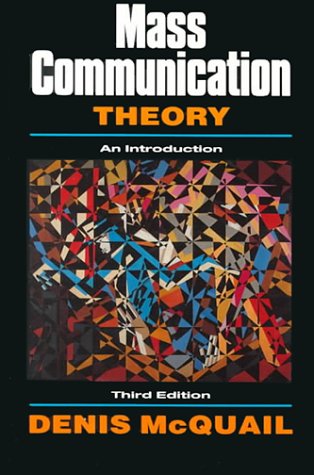Articoli correlati a Mass Communication Theory An Introduction

Sinossi
The fully revised edition of this successful textbook has been comprehensively rewritten to take account of recent theory and research and to improve the accessibility of the text. The book provides a nontechnical introduction to the range of approaches to understanding mass communication. It offers an integrated treatment of the major components of mass communication - the sender, the message and the audience - and encompasses the various forms of mass communication in contemporary societies including television, radio, newspapers, film, music and new communication technologies. Throughout, Denis McQuail shows how theories of mass communication relate to the understanding of society as a whole.
Le informazioni nella sezione "Riassunto" possono far riferimento a edizioni diverse di questo titolo.
Informazioni sull?autore
Denis McQuail (1935-2017) was Emeritus Professor at the School of Communication Research (ASCOR) University of Amsterdam and Visiting Professor in the Department of Politics at the University of Southampton. He studied history and sociology at the University of Oxford and received his Ph.D. from the University of Leeds. He is an Honorary Doctor of the University of Gent. He has published widely in the field of media and communication, with particular reference to audience research, media policy and performance, and political communication. His most recent book publication is McQuail′s Media and Mass Communication Theory, 7th edition., SAGE, 2020, co-authored by Mark Deuze.
Le informazioni nella sezione "Su questo libro" possono far riferimento a edizioni diverse di questo titolo.
EUR 5,78 per la spedizione da Regno Unito a Italia
Destinazione, tempi e costiCompra nuovo
Visualizza questo articoloEUR 42,77 per la spedizione da U.S.A. a Italia
Destinazione, tempi e costiRisultati della ricerca per Mass Communication Theory An Introduction
Mass Communication Theory an Introduction
Da: Better World Books Ltd, Dunfermline, Regno Unito
Condizione: Good. Ships from the UK. Former library book; may include library markings. Used book that is in clean, average condition without any missing pages. Codice articolo GRP11424867
QuantitÓ: 1 disponibili
Mass Communication Theory An Introduction
Da: Goldstone Books, Llandybie, Regno Unito
Paperback. Condizione: Good. All orders are dispatched within one working day from our UK warehouse. We've been selling books online since 2004! We have over 750,000 books in stock. No quibble refund if not completely satisfied. Codice articolo mon0003657007
QuantitÓ: 1 disponibili
Mass Communication Theory. An introduction.
Da: Antiquariat Bookfarm, L÷bnitz, Germania
3. ed., Repr. 416 S. Ehem. Bibliotheksexemplar mit Signatur und Stempel. GUTER Zustand, ein paar Gebrauchsspuren. Ex-library with stamp and library-signature. GOOD condition, some traces of use. 9780803977853 Sprache: Englisch Gewicht in Gramm: 550. Codice articolo 2160935
QuantitÓ: 1 disponibili
Mass Communication Theory. An introduction.
Da: Antiquariat Bookfarm, L÷bnitz, Germania
3. ed., Repr. 416 S. Ehem. Bibliotheksexemplar mit Signatur und Stempel. GUTER Zustand, ein paar Gebrauchsspuren. Ex-library with stamp and library-signature. GOOD condition, some traces of use. 9780803977853 Sprache: Englisch Gewicht in Gramm: 550. Codice articolo 2161124
QuantitÓ: 1 disponibili
Mass Communication Theory. An introduction.
Da: Antiquariat Bookfarm, L÷bnitz, Germania
3. ed., Repr. 416 S. Ehem. Bibliotheksexemplar mit Signatur und Stempel. GUTER Zustand, ein paar Gebrauchsspuren. Ex-library with stamp and library-signature. GOOD condition, some traces of use. 9780803977853 Sprache: Englisch Gewicht in Gramm: 550. Codice articolo 2160928
QuantitÓ: 1 disponibili
Mass Communication Theory: An Introduction
Da: Anybook.com, Lincoln, Regno Unito
Condizione: Good. This is an ex-library book and may have the usual library/used-book markings inside.This book has soft covers. Clean from markings In good all round condition. Please note the Image in this listing is a stock photo and may not match the covers of the actual item,800grams, ISBN:9780803977853. Codice articolo 9470233
QuantitÓ: 1 disponibili
Mass Communication Theory An Introduction
Da: Anybook.com, Lincoln, Regno Unito
Condizione: Fair. This is an ex-library book and may have the usual library/used-book markings inside.This book has soft covers. Book contains pencil markings In fair condition, suitable as a study copy. Please note the Image in this listing is a stock photo and may not match the covers of the actual item,800grams, ISBN:9780803977853. Codice articolo 9621778
QuantitÓ: 1 disponibili
Mass Communication Theory An Introduction
Da: Bahamut Media, Reading, Regno Unito
Paperback. Condizione: Very Good. This book is in very good condition and will be shipped within 24 hours of ordering. The cover may have some limited signs of wear but the pages are clean, intact and the spine remains undamaged. This book has clearly been well maintained and looked after thus far. Money back guarantee if you are not satisfied. See all our books here, order more than 1 book and get discounted shipping. Codice articolo 6545-9780803977853
QuantitÓ: 2 disponibili
Mass Communication Theory An Introduction
Da: AwesomeBooks, Wallingford, Regno Unito
Paperback. Condizione: Very Good. Mass Communication Theory An Introduction This book is in very good condition and will be shipped within 24 hours of ordering. The cover may have some limited signs of wear but the pages are clean, intact and the spine remains undamaged. This book has clearly been well maintained and looked after thus far. Money back guarantee if you are not satisfied. See all our books here, order more than 1 book and get discounted shipping. Codice articolo 7719-9780803977853
QuantitÓ: 2 disponibili
Mass Communication Theory An Introduction
Da: Greener Books, London, Regno Unito
Paperback. Condizione: Used; Very Good. **SHIPPED FROM UK** We believe you will be completely satisfied with our quick and reliable service. All orders are dispatched as swiftly as possible! Buy with confidence! Greener Books. Codice articolo 4652892
QuantitÓ: 1 disponibili

